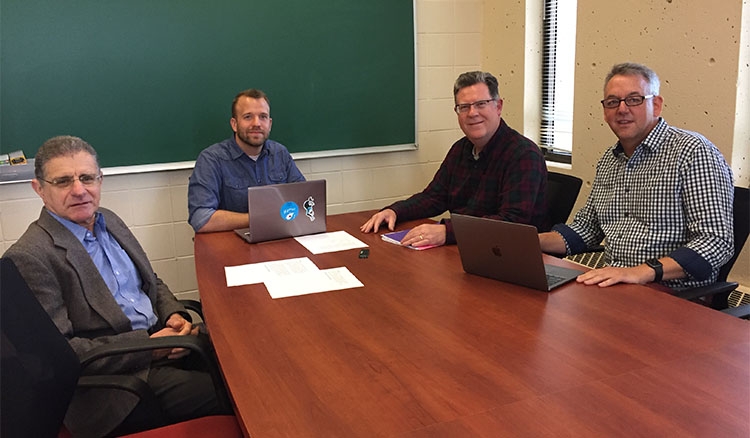 A team of faculty from DePaul University and San Diego State University collaborate during a winter 2018 meeting for the Mathematical Association of America calculus study. From left to right: Ahmed Zayed, chair of DePaul's Department of Mathematics; Matt Voigt, from San Diego State University; Bill Butterworth, associate chair of DePaul's Department of Mathematics; and Chris Rasmussen, from San Diego State University. (Image courtesy of Ahmed Zayed)
A team of faculty from DePaul University and San Diego State University collaborate during a winter 2018 meeting for the Mathematical Association of America calculus study. From left to right: Ahmed Zayed, chair of DePaul's Department of Mathematics; Matt Voigt, from San Diego State University; Bill Butterworth, associate chair of DePaul's Department of Mathematics; and Chris Rasmussen, from San Diego State University. (Image courtesy of Ahmed Zayed)
For decades, calculus has been considered by many to be a "filter" subject - a subject so difficult that it weeds out students not "serious or smart enough" to study mathematics and other sciences. In 2010, the Mathematical Association of America launched a comprehensive study, examining placement exams, courses and common problems to determine how to evolve calculus into a "pump" subject that pushes students through science programs, rather than filtering them out.
DePaul University is now part of the latest study.
Earlier this academic year, the MAA chose DePaul's Department of Mathematical Sciences to be one of 12 universities and colleges across the United States to participate in its most recent calculus study. Funded by the National Science Foundation, the study aims to analyze student progression through calculus courses.
"To be part of this study says something about the way we conduct precalculus and calculus classes at DePaul," says Ahmed Zayed, professor and chair of the Department of Mathematical Sciences. "It's a stamp of approval from colleagues and experts on a national level."
The study, known as "Progress through Calculus," is designed to investigate the impact that various structural, curricular and pedagogical decisions in the calculus course sequences have on student success. Now in its second phase, researchers hope to discover elements that contribute to student success, determine what works and what does not, and learn if factors of success can be imitated at other institutions.
"Our department offers a number of specific and targeted calculus sequences, and we provide students with ample resources for help," Zayed says. "Beyond lectures and their professors, students have access to discussion sessions run by teaching assistants, supplemental instruction leaders, free tutoring, and online tutorial and assessment tools."
During the fall and winter quarters, the MAA research team visited a number of precalculus and calculus courses on campus. The team conducted extensive in-class interviews and surveyed dozens of students currently enrolled in calculus classes. To delve into the pedagogical aspect of course sequences, the team met with more than 30 instructors, teaching assistants and administrators from the College of Science and Health. These groups also included staff from Supplemental Instruction and First-Year Academic Success, Gerry Koocher, dean for the College of Science and Health, and Caryn Chaden, associate provost for student success and accreditation.
Moving forward, the research team will continue to conduct follow-up interviews and collect data. Though the overall project is expected to last through 2019, the MAA plans to share a report with DePaul at the end of this academic year.
"We look forward to learning what the MAA sees as our strengths, and potential areas where we might focus more efforts for improvement," Zayed says. "But overall, it's an honor to make a contribution to the national dialogue around student success and the advancement of these courses."